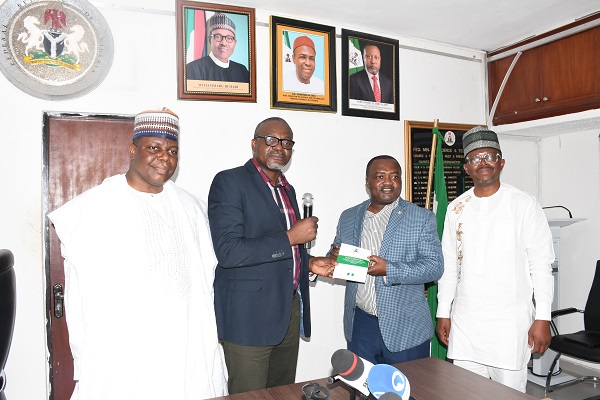
The Minister of Science, Technology and Innovation, Dr. Ogbonnaya Onu, has urged African countries to look inwards and deploy indigenous innovations in their quest to enhance food security.
He made this call when he received a delegation of biotechnology/biosafety team members from Ghana, on a study tour of Nigeria, when they paid him a courtesy call at the ministry today (April 5, 2022) in Abuja.
Represented by the ministry’s overseeing permanent secretary, Mr. Idowu Afe, Onu encouraged the team – made up of members of the Ghana parliament, regulators, policymakers, researchers and development experts – to look at strides Nigeria has made in the last couple of years to firm up her science, technology and innovation (STI) policy to boost agricultural productivity amongst others. He said Africa cannot continue to depend on foreign aid to feed her growing population.
“We encourage you to look at what we have done. In the last couple of years, we have had several policies; one of which is the National Policy on Science, Technology and Innovation, which was reviewed and launched on March 14, 2022.
“That policy touched all the STI ecosystem on how we can use technology to ensure we have food security. Africa’s population is growing at an exponential rate and if we are going to maintain the level of security, we have today we need to ensure that we have food security. It addressed the issue of food security and commercialisation of research results and output,” he said.
Earlier, the representative of the African Agricultural Technology Foundation (AATF), Dr. Onyekachi Francis, said the team was in Nigeria as a result of the testimony of farmers who had benefitted from the newly approved Pod Borer Resistant (PBR) cowpea, which was spread nationally and internationally.
“We work in partnership with the National Biotechnology Development Agency (NABDA) which oversees biotechnology development. As you are aware, Nigeria, through the efforts of this agency has commercialised the Bt cotton and cowpea which are currently in the hands of farmers. Also, we have maize and other products improved using biotechnology that is currently going through the process to be approved, so [that] farmers can plant it.
“Looking at all these you see that Nigeria has advanced in terms of the policies and regulation of biotechnology, as well as commercialisation process. Looking at this achievement in Nigeria, the Federal Ministry of Science, Technology and Innovation through NABDA has played a very critical role.
“So, the Ghanaians are here to look at what Nigeria has done in developing her policy, regulatory and commercialisation infrastructure. The purpose of this visit is to interact with Nigerian policymakers, regulators, politicians and the private sector” he stated.
Corroborating the AATF West Africa representative’s remarks, the leader of the delegation and chairman, Parliamentary Select Committee on Ministry of Environment, Science, Technology and Innovation (MESTI), Parliament House, Accra, Ghana, Dr. Emmanuel Marfo, said the team was on the tour to learn from Nigeria.
Marfo was excited that both West African countries are learning from each other, adding that the interaction shows Africa is moving beyond the mindset that any good thing must be learnt from the West.
“I believe we, in Nigeria and Ghana, are doing a lot of good work and if we share with an open mind, we can champion the development of Africa and hasten it. We are happy to be here and to learn.
“I believe that at the level of technical cooperation we must move also to parliamentary cooperation and diplomacy because in most of our countries a lot of things can work faster if we have parliamentary backing in terms of the regulation that we pass, budget allocations and all the facilitation that you may need from government to be able to do the things that we do in our laboratories. That is why we are excited to be part of the delegation,” he added.


